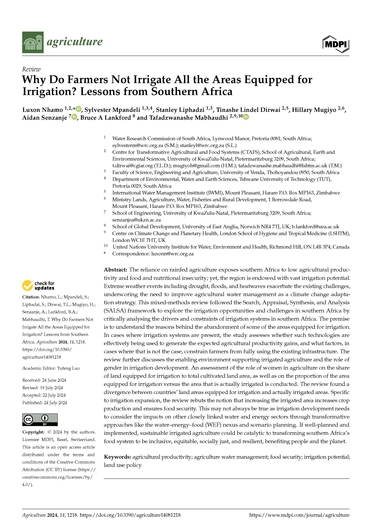Why do farmers not irrigate all the areas equipped for irrigation? Lessons from Southern Africa
Abstract
The reliance on rainfed agriculture exposes southern Africa to low agricultural productivity and food and nutritional insecurity; yet, the region is endowed with vast irrigation potential. Extreme weather events including drought, floods, and heatwaves exacerbate the existing challenges, underscoring the need to improve agricultural water management as a climate change adaptation strategy. This mixed-methods review followed the Search, Appraisal, Synthesis, and Analysis (SALSA) framework to explore the irrigation opportunities and challenges in southern Africa by critically analysing the drivers and constraints of irrigation systems in southern Africa. The premise is to understand the reasons behind the abandonment of some of the areas equipped for irrigation. In cases where irrigation systems are present, the study assesses whether such technologies are effectively being used to generate the expected agricultural productivity gains, and what factors, in cases where that is not the case, constrain farmers from fully using the existing infrastructure. The review further discusses the enabling environment supporting irrigated agriculture and the role of gender in irrigation development. An assessment of the role of women in agriculture on the share of land equipped for irrigation to total cultivated land area, as well as on the proportion of the area equipped for irrigation versus the area that is actually irrigated is conducted. The review found a divergence between countries’ land areas equipped for irrigation and actually irrigated areas. Specific to irrigation expansion, the review rebuts the notion that increasing the irrigated area increases crop production and ensures food security. This may not always be true as irrigation development needs to consider the impacts on other closely linked water and energy sectors through transformative approaches like the water–energy–food (WEF) nexus and scenario planning. If well-planned and implemented, sustainable irrigated agriculture could be catalytic to transforming southern Africa’s food system to be inclusive, equitable, socially just, and resilient, benefiting people and the planet.

